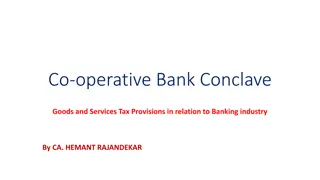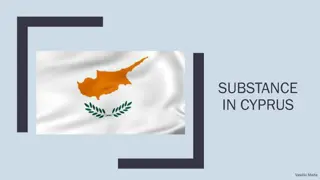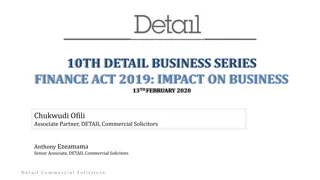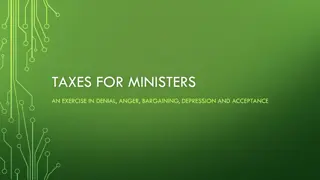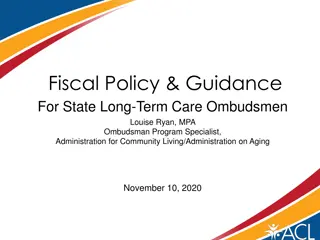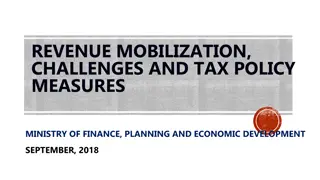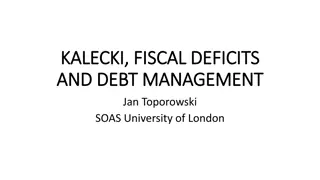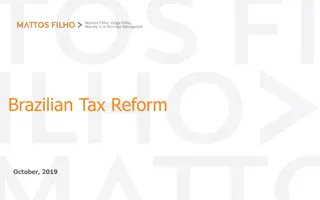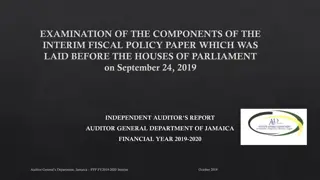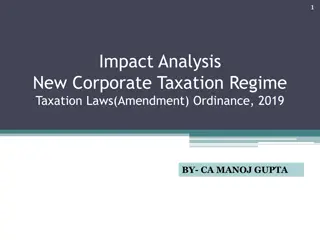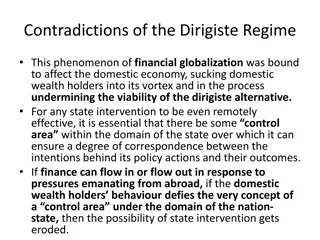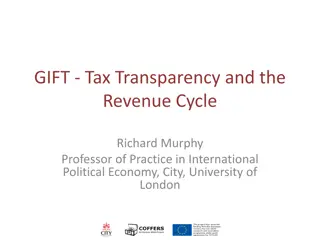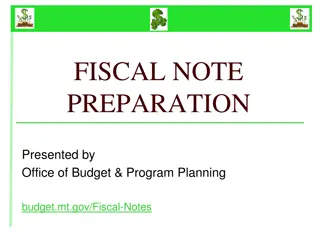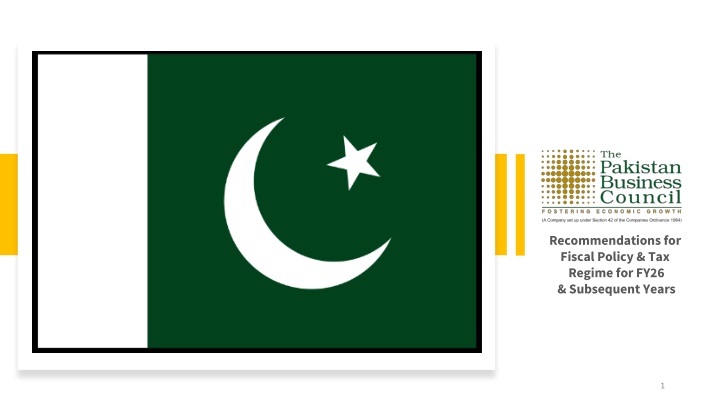
Recommendations for Fiscal Policy & Tax Regime FY26
"Explore comprehensive recommendations for fiscal policy and tax regime in Pakistan for FY26 and beyond, focusing on economic growth, investment, job creation, and sustainable development."
Download Presentation

Please find below an Image/Link to download the presentation.
The content on the website is provided AS IS for your information and personal use only. It may not be sold, licensed, or shared on other websites without obtaining consent from the author. If you encounter any issues during the download, it is possible that the publisher has removed the file from their server.
You are allowed to download the files provided on this website for personal or commercial use, subject to the condition that they are used lawfully. All files are the property of their respective owners.
The content on the website is provided AS IS for your information and personal use only. It may not be sold, licensed, or shared on other websites without obtaining consent from the author.
E N D
Presentation Transcript
Recommendations for Fiscal Policy & Tax Regime for FY26 & Subsequent Years 1
THEPAKISTAN BUSINESS COUNCIL Pakistan s pre-eminent business advocacy body >100 Pakistani groups & MNCs from 14 countries Takes Research-based business advocacybody medium/long term view Not a tradebody or a chamber. Pan- sectoral advocacy for the good of Pakistan Critique as wellas support the government Leading private sector Mfg & servicesbusinessesfrom 20 sectors 2
Significant Economic Footprint 20 Sectors of the Economy % Direct Tax Cont 33% PBC Members 67% % Exports 40% PBC Members 60% 3
A tax-to-GDP ratio is NOT the objective but an outcome of sound fiscal policy, which responds to the country s long-term objectives to promote investment, create jobs, support exports, and competitively reduce import reliance. Thus, it helps to achieve sustainable and equitable growth in the GDP. 4
KEY ECONOMIC OBJECTIVES AND HOW FISCAL POLICY HELPS ACHIEVE THESE BALANCED EXTERNAL ACCOUNT EXPORTS INDIGENIZATION BALANCED FISCAL ACCOUNT POSITIVE SOCIAL OUTCOME Fiscal Policy FORMALIZATION & BROAD TAX BASE INVESTMENT BUSINESS GROWTH EMPLOYMENT SOCIO- ECONOMIC DEVELOPMENT PRODUCTIVITY
SEVEN STRATEGIC IMPERATIVES OF FISCAL POLICY Grow business to grow the tax revenue & meet economic and social objectives Equitably distribute the tax burden Levy taxes at competitive rates Provide long-term policy predictability Tax profit, not turnover or assets Simplify, unify, harmonize, and digitize returns Minimize impact on the cash flow of business 6
GROW BUSINESS TO GROW THE TAX REVENUE Strategic Thrusts Policy Recommendations 1. Encourage investment through corporatization & listing, widen & encourage longer-term shareholding. 2. Promote scale, consolidation, and diversification. a) 1% lower corporate tax rate on listed companies with minimum float of 25% throughout the year. b) Stop multiple taxation of dividends in group structures. c) Reduce super tax rate on non-export profit by 2% per annum; levy Super Tax progressively on slabs; adjust slabs for inflation. d) Remove CGT on listed co. shares after a 3-year holding period. e) Exempt CGT on non-listed co. shares after a 10-year holding period. f) Remove tax on bonus shares. a) 1% lower corporate tax rate on the incremental profit of new exporters achieving 15%+ sales through exports. b) 1% lower corporate tax rate on the incremental profit of current exporters increasing exports by 15%. c) 1% lower corporate tax rate on the entire profit of companies increasing reliance on indigenous inputs by 15%. d) Reduce super tax on export profit to half in FY26; phase out by FY28. a) Support sectors in which Pakistan has a comparative advantage. b) Rationalize taxes on cellular and fixed-line internet connectivity. c) Restore the passthrough tax treatment hitherto available to investors in private equity and venture capital funds. new new new 3. Support exports and indigenization new new new new 4. Support sectors of the future new 7 new
EQUITABLY DISTRIBUTE THE TAX BURDEN Policy Recommendations a) All resident tax return filers should be required to submit wealth reconciliations. b) Formal sector s responsibility to verify tax credentials should be limited to its direct FBR registered suppliers and customers as displayed on the FBR portal. c) An advance tax of 39% should be levied on non-filer commercial and industrial customers' electricity and gas bills, followed by disconnection of utility connections. d) Gain of sale of land should be taxed @ 39% if disposed within 10 years of purchase. Reduced rate of 15% be allowed incase holding period exceeds 10 years. Presently, gain on disposal of land is taxed @ 15% irrespective of holding period whereas profit earned by companies is taxed @ 46% (29% tax, 10% super tax, 2% WWF and 5% WPPF). e) Phase out tax concessions, such as for FATA & PATA. f) Enter into Electronic Data Interface (EDI) arrangements with major trading partners. g) Provide anonymized visibility of import declarations to serve as a check on under-invoicing. new new new 8
REGIONALLY COMPETITIVE TAX RATES Policy Recommendations a) Reduce the tax rate on the formal corporate sector by 1% annually until it reaches 25%, in line with other emerging economies. new b) Reduce the GST rate by 1% annually until it reaches 15%. new c) Reduce the tax burden on salaried employees to stem the brain drain and loss of talent to the informal sector. Revise the tax slabs to adjust for inflation. 9
LONGER-TERM PREDICTABLE POLICIES Policy Recommendations a) Separate policy-making from collection of taxes. b) Ensure that taxpayers representatives and the ministries of planning, industries, investment, and commerce are represented on the policy board so that the fiscal policy is aligned with other policies. c) Grandfather existing investors from a change in tax policy if there remains an unexpired period of benefit under the previous policy, when investment was made. new 10
TAX PROFIT, NOT TURNOVER OR ASSETS Policy Recommendations a) Starting with listed companies, phase out the minimum turnover tax. b) Future taxation should not be based on the balance sheet of banks or companies. new c) Tax income, not the declared overseas assets of Pakistan tax residents. new 11
SIMPLIFIED, UNIFORM & DIGITIZED TAX RETURNS Policy Recommendations a) Establish a fully functional National Tax Authority (NTA) to serve as a single-window assessment platform for taxpayers. b) Taxes collected through the NTA should be transferred immediately to federal and provincial authorities based on a predefined and mutually agreed-upon mechanism. This will streamline compliance, reduce administrative burden, and enhance efficiency in tax collection and distribution. 12
MINIMISE IMPACT ON CASH FLOW OF BUSINESS, ESPECIALLY OF EXPORTERS Policy Recommendations a) Reduce WHT, on exporters from 2% to 1%; rationalise WHT on the services sector. b) Reduce WHT on recyclable materials for a level playing field with the informal sector. c) Exempt listed companies from Section 8B of the Sales Tax Act 1990 which limit offset of input tax to 90% of output tax. d) The current monthly export threshold of 50% under Section 8B for offset of input tax is high, depletes the cash flow, and impedes exports. A reduction to 10% is recommended. e) Exemption Certificates for those paying quarterly advance income tax should be restored. f) The limit on processing GST refunds should be harmonized for both the erstwhile zero-rated and non-zero-rated sectors to promote the broadening of the export basket. g) Allow offset by taxpayers of admitted income tax refunds against the current year s tax liability. h) Restore the zero GST rating on supplies by local suppliers to exporters under the Export Facilitation Scheme to encourage exporters to use local inputs. i) Review and reduce advance tax on export proceeds to 0.5% for low-margin exports, especially by SMEs which lack the stamina to wait for eighteen months to receive a tax refund. new new new new new 13
RECOMMENDATIONS ON BROADENING OF THE TAX BASE - 1 Sr. # Issue Recommendation Rationale There is no bar on non-filers using their credit cards for international transactions The data on tax withheld by the formal sector from its suppliers is not mined by the FBR to grow the tax base. This includes tax withheld on rental of property Containers carrying Afghan Transit Trade, until recently had trackers and satellite supervision. This has been replaced by manual supervision and trackers on prime load mover trucks, pending acquisition of technology. There is a risk that cargo may be removed from the containers. Disallow use of credit cards for foreign transactions by non-filers Discourage them from remaining non- filers 1. WHT deductions on payments made to suppliers/landlords by the formal sector need to be traced to identify new taxpayers 2. Grow the tax base For large volume, low value items, a Radio Frequency Identification Device (RFID) be placed on the master carton, while for high value, low volume items like mobile phones, RFIDs can be placed on packaging in which the item is sold Will increase transparency in ATT cargo movement and also provide learning on use of RFIDs for other applications 3. Will allow FBR to differentiate the legitimate product from the smuggled one and lead to increase in government revenues. These dyes are used extensively in Africa. Smuggled petrol, diesel, and lubricating oil is being sold in the market and it is not possible to distinguish these from the duty paid products Use fuel marking dyes to separate the legitimate product from the smuggled ones 4. 7-E for non-filers should be charged from the date of enactment of the legislation or the acquisition of the property, whichever is later Advance tax should be collected on the purchase and sale of land in housing societies 7-E only penalizes non-filers at the time of disposal of the asset, and that also for one year This will reduce incentive for non-filers to invest in real estate 5. Advance tax on purchase and sale of land in housing societies is not being charged Will bring greater transparency in sale and purchase of plots in societies 6. 15
RECOMMENDATIONS ON BROADENING OF THE TAX BASE - 2 Sr. # Issue Recommendation Rationale There is currently no restriction on the number of cars that an individual can register under his/her name, this leads to benami transactions The issue of STOP FILERS needs to be addressed. Many persons register in income tax just to avail a one-time reduction in income tax withholding on purchase / sale of property / vehicles. After availing reduced income tax withholding rates, they usually get themselves deregistered. Restrict the number of cars that a person can register in his/her name to 10 (ten) 7. This will help control benami transactions To avoid the issue of STOP FILERS, deregistration should not be allowed within 5 years of registration except in genuine cases like death / bankruptcy etc. To reduce misuse of lower WHT rates for filers by non-filers 8. Transfers to provinces from the NFC should also reflect the provinces own tax collection efforts Provinces contribute less than 1% to overall tax collection 9. This will increase the tax base Further sales tax of 4% on sales to unregistered persons is leading to flying invoices Reduce the rate of further sales tax to reduce the practice of flying invoices 10. Better documentation of the economy Appellate orders should clarify if the officer's action was due to an interpretational issue or a deliberate misapplication of the law. In cases of deliberate misapplication, FBR should put in place a suitable mechanism to punish tax officer. An advance tax of 39% should be levied on the electricity and gas bills of commercial and industrial customers that are not filers of tax returns. After a period, their utility connections should be disconnected. Tax officers, often create exaggerated tax demands that are reversed during the appeal process To reduce unnecessary harassment of taxpayer 11. Some commercial and industrial consumers of utilities are not registered for tax 12. Will broaden the tax base 16
RECOMMENDATIONS ON BROADENING OF THE TAX BASE - 3 Sr. # Issue Recommendation Rationale Tax returns are accepted without reconciliation of wealth All resident tax return filers should be required to submit wealth reconciliations. 13. Improve accountability There is a wide difference in actual value of land / immovable properties and the values fixed by the FBR FBR values should be revisited to reflect actual market value. To discourage parking of black money in real estate sector. 14. POS prize scheme should be relaunched. At the time when this scheme was in place, many retailers were forced to issue QR code-based sales tax invoices due to pressure from customers as well as fear of online complain to FBR by customers. Retailers should be encouraged to register for POS integration through the following incentives: FBR has discontinued the POS prize scheme even through a Re 1 per invoice is being collected from retail customers. 15. To improve accountability i. Sales Tax rate for POS integrated retailers of textile and leather sector has been increased to 18% from earlier 15%. Sales Tax should be reduced to 14% for all POS integrated retailers of all sectors and to 13% in the first year for newly integrated retailers as a welcome gesture; Retailers / wholesales who are not POS integrated are afraid of unfair proceedings by FBR officials. To encourage retailers / wholesales to join the tax net through a transparent manner. 16. ii. ii. absolve the newly POS integrated retailers from tax audits / proceedings relating to pre-registration period. 17
RECOMMENDATIONS ON BROADENING OF THE TAX BASE - 4 Sr. # Issue Recommendation Rationale We should emulate the experience of India to implement cashless transactions. Majority of retailers / street vendors are not accepting payment through debit / credit cards. Broaden the tax base 17. 18



![Town of [Town Name] Real Estate Tax Rates and FY 2024 Budget Summary](/thumb/62211/town-of-town-name-real-estate-tax-rates-and-fy-2024-budget-summary.jpg)

